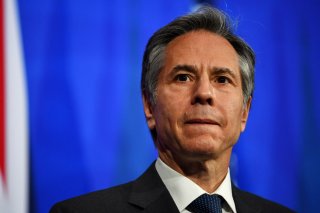A Small U.S. Investment in Rwanda Could Pay Huge Security Dividends
Too often policymakers and progressives depict proactive defense and the war on terrorism as an endless, extension, or counterproductive but, in the case of Rwanda, a small investment could pay tremendous dividends.
BUSASAMANA, RWANDA—I walked through the forest in the Rubavu district of western Rwanda with some Rwandan soldiers. For the rainy season, it was an uncharacteristically clear day. Just eight miles away, steam rose from the summit of the eleven-thousand-foot Mount Nyiragongo, one of Africa’s most active volcanoes. As we stood on the tree line—the border between Rwanda and the Democratic Republic of Congo—we could see smoke from charcoal rising just a couple miles away from Congo’s Virunga National Park. The fires marked campsites of the Democratic Forces for the Liberation of Rwanda (FDLR), the remnants of those who committed genocide against the Tutsi in Rwanda in 1994. Just a couple miles away, we could see trucks rumble down Congolese highway N2 at the spot where, just three months ago, U.S.-designated terrorists ambushed a convoy carrying Italian ambassador Luca Attanasio, killing him and two colleagues in a hail of gunfire.
Twenty-seven years after the anti-Tutsi genocide, Rwanda is a different country. President Paul Kagame has largely stamped out corruption. The capital Kigali has become a regional and even continental business and banking hub. Whereas the Habyarimana and Sindikubwabo regimes embraced eugenics and racial classification instituted by the Belgians during the colonial era and denigrated Tutsis as cockroaches, Rwanda today embraces a strict meritocracy. Rwandan identity cards no longer categorize ethnicity. Hutus and Tutsi both serve in leadership positions in business, education, and the military. On my first day in the country, I met a mid-career military officer with a Ph.D. in particle physics from the University of Virginia. The country is now among world leaders in e-government; its Irembo portal unveiled in 2017 had put eighty-three government services online within two years.
Progress is fragile, however, as the campfires just a few miles away made clear. Génocidaires who fled to the jungles to avoid accountability and FDLR terrorists just across the border in Congo or nearby Uganda infiltrate across the border every few years. Further north, I met those who witnessed or were wounded or widowed in the 2018 terrorist attack.
Security is under threat in Africa. Somalia is in shambles and Ethiopian unity is no longer a certainty. The Islamic State has begun an insurgency in Mozambique and is trying to seek its roots in the Democratic Republic of the Congo. Sahel security, already tenuous, grew more so after the death of Chadian President Idriss Déby. The Boko Haram insurgency continues to erode state control in Nigeria, while Al Qaeda affiliates have put vast swaths of Burkina Faso out of reach.
Against this backdrop, the United States should neither take stability nor progress for granted. Terrorists—whether Islamic State or Hutu extremists—are nihilistic. They want to destroy. Successive American administrations, as well as U.S. African Command, have been both passive and reactive in the face of threats.
Too often policymakers and progressives depict proactive defense and the war on terrorism as an endless, extension, or counterproductive but, in the case of Rwanda, a small investment could pay tremendous dividends. Rwanda has a 137-mile long border with Congo, 107-miles with Uganda, and 196-miles with Burundi. While the Congolese city of Goma and the Rwandan town of Gisenyi form a contiguous whole divided by the border and well-functioning and highly automated crossing posts, much of the Rwanda-Congo border is forested or grassland and unfenced. The same is true on Rwanda’s northern and southern frontiers.
A relatively cheap technology that could prevent instability and terrorist advances would be the installation of a network of cameras activated by motion detectors that regional military facilities could use to monitor incursions to confront them before they can attack villagers or loot farms again.
Rwanda has likewise embraced drones, although mostly for medical and commercial purposes. While it has some basic military capabilities, provision of high altitude, infrared sensing surveillance drones that can detect terrorist camps and movements in Congo’s foggy and rainy forests could help push back or defeat a terrorist threat that has festered for years. Congo would not likely object given how DFLR and other groups have targeted Virunga National Park rangers, poached wildlife, illegally taxed local residents, and created insecurity which has undercut a tourist industry essential to the local economy. If drones can map rebel camps and detect movements, then Congolese forces—who have also suffered greatly at the hands of the terrorist groups—can conduct arrests. Indeed, given Italy’s recent loss, the State Department might even coordinate with Attanasio’s home ministry to shoulder some of the costs.
President Joe Biden has repeatedly promised to stop “endless wars.” In Rwanda and Congo, he has the ability to end a latent conflict that has festered for decades by eliminating the remnants of the former racist and genocidal Rwandan regime sworn on return. Indeed, a relatively small investment could pay huge dividends by solidifying regional stability and turning the tide against terrorists whose ideologies might differ but who often coordinate in order to further their broader aims.
Michael Rubin is a resident scholar at the American Enterprise Institute (AEI). You can follow him on Twitter: @mrubin1971.
Image: Reuters

